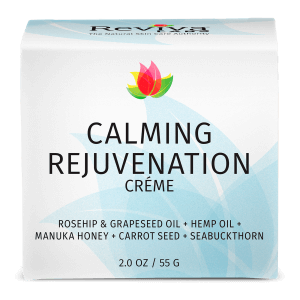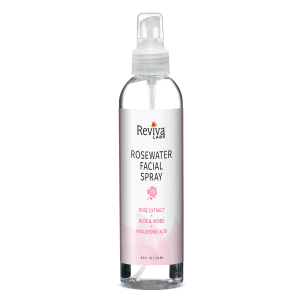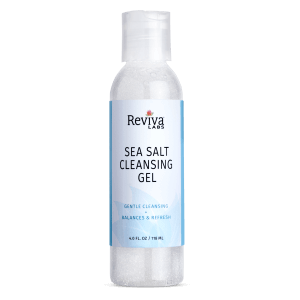Reviva Labs, Skin Care
How Allergies Affect the Skin
Allergies can have a significant impact on the skin, often manifesting as uncomfortable, and sometimes unsightly, symptoms. These reactions can be triggered by a variety of factors, including environmental allergens, certain foods, and even skincare products. Understanding how allergies affect the skin and knowing how to treat them effectively is essential for maintaining healthy, comfortable skin.
Identifying Skin Allergies
Skin allergies can present in various ways, with symptoms ranging from mild to severe. Common signs include redness, itching, swelling, and the appearance of hives or eczema. These reactions occur when the immune system mistakenly identifies a harmless substance as a threat, leading to an inflammatory response. Identifying the allergen is crucial for effective treatment and prevention of future reactions.
Common Allergens and Triggers
Many types of allergens can provoke skin reactions. These include environmental factors like pollen, grass, pet dander, and dust mites being among the most common. Each of these elements can easily encounter the skin, leading to irritation and allergic responses. In addition, certain foods like nuts, dairy products, and shellfish, can trigger systemic allergic reactions that can manifest on the skin, causing rashes, hives, or even more severe symptoms.
The skincare product can also create potential triggers. Ingredients such as fragrances, preservatives, and certain chemicals can be problematic for people with sensitive skin, leading to reactions ranging from mild irritation to full-blown allergic dermatitis. It’s crucial for those with sensitive skin to be aware of these common triggers and to carefully read product labels to avoid potential allergens.
The Impact of Allergies on the Skin
Allergic reactions can impact the skin in a variety of ways. Some reactions are immediate while others develop over time. Initially, symptoms like itching and discomfort can disrupt daily routines and interfere with sleep, leading to a decrease in overall quality of life. The natural reaction to itchy skin is to scratch, but this can exacerbate the problem, causing further irritation and increasing the risk of infection. Prolonged exposure to allergens or repeated allergic reactions can lead to more chronic skin conditions, such as eczema or contact dermatitis. Over time, these conditions can cause the skin to thicken and develop areas of hyperpigmentation underscoring the need for effective treatment to avoid long-term damage.
Treatment and Management of Skin Allergies
Addressing skin allergies begins with identifying and, if possible, avoiding the allergen responsible for the reaction. For immediate relief, over-the-counter antihistamines can help reduce itching and swelling. Topical treatments, such as corticosteroid creams and ointments, are effective in reducing inflammation and soothing irritated skin. In cases of severe or persistent allergic reactions, a healthcare professional may prescribe stronger medications or recommend allergy testing to identify specific triggers. This can be particularly useful in developing a long-term management plan to avoid future reactions and maintain healthy skin.
Soothing Allergy-Affected Skin
Caring for skin affected by allergies requires a gentle approach. It is essential to use skincare products free from common irritants like fragrances and dyes, which can further aggravate sensitive skin. Regular moisturizing is crucial for maintaining the skin’s barrier function, helping to protect against allergens and reduce susceptibility to irritation. Natural ingredients such as aloe vera, chamomile, and oatmeal are known for their soothing properties and can provide relief from itching and inflammation. By adopting a gentle skincare routine, individuals with allergy-prone skin can help alleviate symptoms and promote healing.
Preventing Future Allergic Reactions
The key to preventing future allergic reactions lies in a combination of avoiding known allergens and reinforcing the skin’s natural defenses. Regular use of gentle, hypoallergenic skincare products can support the skin’s barrier function, making it less vulnerable to allergens. It’s also important to stay alert to potential environmental triggers, especially during times of the year when allergens like pollen are more prevalent. By taking proactive steps to protect the skin and minimize exposure to allergens, individuals can reduce the likelihood of future allergic reactions and maintain healthier, more comfortable skin.
When to Seek Medical Help
While many allergic reactions can be managed at home, some require medical attention. If you experience severe symptoms, such as difficulty breathing or swelling of the face and lips, seek emergency medical care. A dermatologist or allergist can provide guidance on managing chronic skin allergies and offer treatment options tailored to your specific needs.
While allergies can pose a significant challenge to the skin, there is hope. With the right knowledge and care, their impact can be minimized and soothed. Identifying triggers, treating symptoms promptly, and adopting a gentle skincare routine are key steps in managing skin allergies. If you struggle with persistent or severe allergic reactions, consulting with a healthcare professional can provide further insights and solutions for keeping your skin healthy and comfortable.
Video Blog Summary












